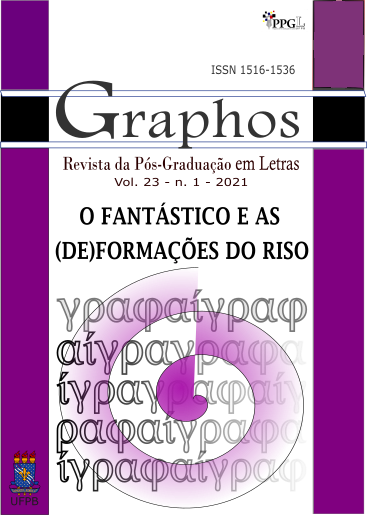Binomy and strangeness in Noite na Taverna, by Álvares de Azevedo
DOI:
https://doi.org/10.22478/ufpb.1516-1536.2021v23n1.56468Keywords:
Fantastic, Fiction, Grotesque, Sublime, NarrativeAbstract
The article discusses fantastic traits in Noite na taverna. The critical path adopted takes as a theoretical source Todorov's (2003) considerations and the presence of the Azevedian binomial as a constitutive element of the work. Based on the concepts of sublime in Longino (2020) and grotesque in Hugo (1992) we will glimpse the presence of aesthetic elements of the fantastic stranger, according to Todorov (2003), in our corpus. We will avoid, in this study, to problematize the idea of Longino (2020) as to the effect of the extraordinary as a mark of the sublime, we prefer, in the organizational line of this article, to point to the idea of transcendence to the immediate real in relation to the imagetic, in the considerations of the Greek author, as a contact point between his reflection on the sublime and the classification made by Todorov (2003) in relation to the fantastic. As the main methodological path we comment on the corpus in order to approach stylistic and aesthetic elements in Álvares de Azevedo text that mobilize aspects such as grotesque, laughter and strangeness in search of the dialogue between the natural and the supernatural real understood as factors of construction of the fictional universe of fantastic character in Noite na taverna.
Downloads
References
ADONIAS, Filho. Apresentação à Noite na taverna. In: AZEVEDO, Álvares de. Noite na taverna. 15. ed. Rio de Janeiro: Ediouro, 1996.
ALVES, Cilaine. O belo e o disforme: Álvares de Azevedo e a ironia romântica. São Paulo: Edusp/Fapesp, 1998.
AZEVEDO, Álvares de. Noite na taverna. 15. ed. Rio de Janeiro: Ediouro, 1996.
AZEVEDO, Álvares de. A lira dos vinte anos. 26. ed. Rio de Janeiro: Ediouro, 1998.
CAMILO, Vagner. Risos entre pares: poesia e humor românticos. São Paulo: Edusp, 1997.
CORTAZAR, Júlio. El sentimiento de lo fantástico. Conferência proferida na Venezuela, por Júlio Cortazar, em la U.C.A.B., em 1982. Disponível em: https://campus.almagro.ort.edu.ar/lengua/articulo/1332085/el-fantastico-segun-julio-cortazar . Acesso em: 06 dez. 2020.
HUGO, Victor. Prefácio de Cromwell. In.: GOMES, Álvaro Cardoso; VECHI, Carlos Alberto. A estética romântica: textos doutrinários comentados. Tradução Maria Antônia Simoes Nunes e Decílio Golombini. São Paulo: Atlas, 1992.
LE GOFF, Jacques. História e memória. Tradução Bernardo Leitão et al. Campinas, SP: Editora da UNICAMP, 1990.
LONGINO, Dionísio. Do sublime. Tradução de Marta Isabel de Oliveira Várzeas. Coimbrã: Imprensa da Universidade de Coimbrã. Disponível em: https://digitalis-dsp.uc.pt/bitstream/10316.2/38162/1/Do%20Sublime.pdf . Acesso em 01 dez. 2020.
SHAKESPEARE, William. Hamlet. 3. ed. Tradução de Péricles Eugênio as Silva Ramos. São Paulo: Abril Cultural, 1976.
TODOROV, Tzvetan. Introdução à literatura fantástica. 2. ed. São Paulo: Perspectiva, 2003.
Downloads
Published
Issue
Section
License
Copyright (c) 2021 Danglei Castro Pereira

This work is licensed under a Creative Commons Attribution 4.0 International License.







